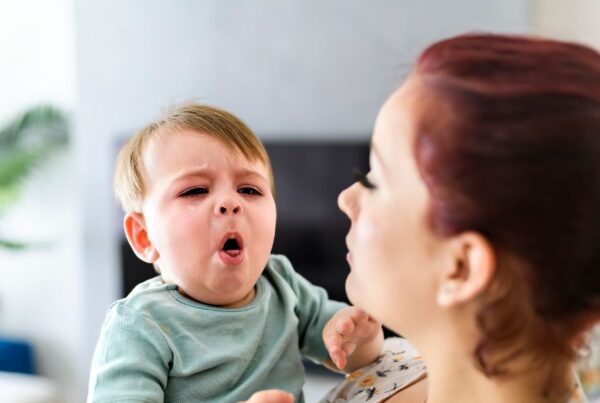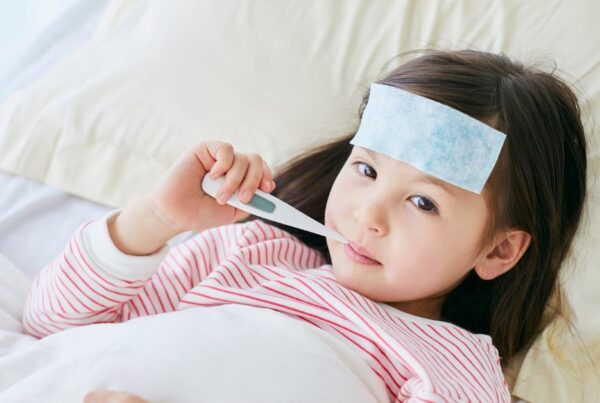Growing pains are common in kids between the ages of 4 and 12 years old (1). Growing pains are crampy, achy, and/or throbbing leg pains that happen in the evening or at night and may sometimes disrupt sleep (1, 2).
This article covers some natural medicine treatments for growing pains, including nutrient supplements, massage, and my favorite homeopathic remedies.
What Are Growing Pains?
Growing pains are pains that occur in the legs of young children during the evening or at night. They are often described as crampy, achy, and/or throbbing. Despite their name, growing pains aren’t linked to periods of increased growth but rather to periods of increased activity (1, 2).
The link to increased activity has led to the theory that growing pains are related to fatigue of muscles and/or bones after periods of overuse. There is likely a genetic component as growing pains seem to run in families. Additionally, there is possibly a psychological component as it has been observed that pains may worsen during times of increased stress. Growing pains have also been linked to a lower pain threshold (1, 2).
Both circulatory causes and biomechanical causes (eg. skeletal alignment) have been investigated, but the evidence behind these causes isn’t convincing (1, 2).
Reassurance Is Important When Kids Have Growing Pains
Growing pains can cause a great deal of anxiety and stress for kids. It is always important to reassure them that growing pains are a normal part of growing up and that they won’t last forever (1, 2).
Nutrients That May Help Growing Pains
The best studied nutrient for growing pain treatment is vitamin D (2-5). Vitamin D seems to help by strengthening bones, which reduces skeletal fatigue (5). Because vitamin D likely works by improving bone mineral density, results take time. One study showed that vitamin D supplementation resulted in less pain after 3 months, and pain further decreased after 24 months of supplementation (5).
Magnesium is a nutrient that I sometimes add into growing pain treatment in my clinical practice. It hasn’t been well researched for growing pains, but in my experience, I find that magnesium is a reliable help for muscle pain (6). Additionally, magnesium, like vitamin D, is important for normal, healthy bone growth (7). Magnesium can be taken internally as a supplement or it can be applied externally in the form of a magnesium-containing body cream or an Epsom salt bath.
Botanical Massage For Growing Pains
Massage from parents is one of the most recommended treatments for growing pains (1, 2, 8). Kids are helped both by the soothing touch and by the act of love and care from their parents. Massage can be done over clothes or directly on skin.
Follow your child’s directions when it comes to pressure and speed. Make sure that they know to tell you if the massage doesn’t feel good and that you will stop right away. Leg massage is best started at the upper thigh (or hamstring if you’re massaging the back of the leg), followed by massage down the leg to the foot and toes, then a gradual return to the hip. Extra time and care can be spent over areas that are more tender. Be sure not to press too hard on the back of the knee as this is a tender area.
Adding topical herbal preparations traditionally used for musculoskeletal pain might help make the massage more therapeutic. Arnica oil is the first botanical preparation that I would recommend, but other herbs like devil’s club, lavender, and St. John’s wort can be helpful as well.
Homeopathic Remedies For Growing Pains
I’ve found homeopathic remedies indispensable for dealing with growing pains. I usually give four pellets of 200 CH (or 30 CH) every 20 minutes until pain is resolved and/or the child falls back to sleep. If pain isn’t improved after 2-3 doses, try another remedy. For more information about dosing homeopathic remedies, see my post: How To Use Homeopathic Remedies – A Quick-Start Guide For Families.
There are various homeopathic remedies that are helpful for growing pains. These are the top three remedies that I use in my home and practice:
- Arnica is almost always my first-line homeopathic treatment for pain no matter the cause. It is helpful for soreness of all types plus my kids associate it with relief, which automatically activates a mind-body response.
- Ledum is helpful for leg pain when it is a deep ache. This remedy isn’t often listed for growing pains, but it is one that I’ve seen help many kiddos, including my own.
- Rhus Tox is what I think of most often for joint or muscle pain that has resulted from overuse and strain.
Over-The-Counter Pain Medication For Growing Pains
Though I prefer to avoid over the counter pain medications for kids when possible, sometimes growing pains interfere with sleep, which is absolutely essential for optimal health. In these cases, I will give a low, age appropriate dose of ibuprofen (preferred) or tylenol if natural interventions don’t provide enough relief.
To learn more about the pros and cons of various over-the-counter pain medications, see this article: Are Over-The-Counter Painkillers Safe? – Dr. Green Mom.
When To See A Doctor For Growing Pains
Occasional leg pain that you suspect is caused by growing pains usually doesn’t need medical attention. However, there are times when it can be a sign of something more serious (1, 2). Be sure to check in with your doctor if your child also has symptoms of fever, chills, or seems generally unwell. Other potential red flags include swollen joints and/or decreased range of motion of any part of the leg, leg pain during the day, and leg pain that isn’t improved with massage and pain medication.
Summary
Growing pains are common in young kids between the ages of 4 and 12 years old. Kids eventually grow out of them, but in the meantime they need caring support and pain relief to manage the discomfort. There’s some evidence that vitamin D supplementation may reduce growing pains over time and massage may help children deal with the momentary pain. Clinically, I’ve found that homeopathic remedies and magnesium supplementation may also be helpful.
References:
- Lehman, P. J., & Carl, R. L. (2017). Growing Pains. Sports health, 9(2), 132–138. https://doi.org/10.1177/1941738117692533
- Pavone, V., Vescio, A., Valenti, F., Sapienza, M., Sessa, G., & Testa, G. (2019). Growing pains: What do we know about etiology? A systematic review. World journal of orthopedics, 10(4), 192–205. https://doi.org/10.5312/wjo.v10.i4.192
- Qamar, S., Akbani, S., Shamim, S., & Khan, G. (2011). Vitamin D levels in children with growing pains. Journal of the College of Physicians and Surgeons–Pakistan : JCPSP, 21(5), 284–287.
- Vehapoglu, A., Turel, O., Turkmen, S., Inal, B. B., Aksoy, T., Ozgurhan, G., & Ersoy, M. (2015). Are Growing Pains Related to Vitamin D Deficiency? Efficacy of Vitamin D Therapy for Resolution of Symptoms. Medical principles and practice : international journal of the Kuwait University, Health Science Centre, 24(4), 332–338. https://doi.org/10.1159/000431035
- Morandi, G., Maines, E., Piona, C., Monti, E., Sandri, M., Gaudino, R., Boner, A., & Antoniazzi, F. (2015). Significant association among growing pains, vitamin D supplementation, and bone mineral status: results from a pilot cohort study. Journal of bone and mineral metabolism, 33(2), 201–206. https://doi.org/10.1007/s00774-014-0579-5
- Reno, A. M., Green, M., Killen, L. G., O’Neal, E. K., Pritchett, K., & Hanson, Z. (2022). Effects of Magnesium Supplementation on Muscle Soreness and Performance. Journal of strength and conditioning research, 36(8), 2198–2203. https://doi.org/10.1519/JSC.0000000000003827
- Rondanelli, M., Faliva, M. A., Tartara, A., Gasparri, C., Perna, S., Infantino, V., Riva, A., Petrangolini, G., & Peroni, G. (2021). An update on magnesium and bone health. Biometals : an international journal on the role of metal ions in biology, biochemistry, and medicine, 34(4), 715–736. https://doi.org/10.1007/s10534-021-00305-0
- Lowe, R. M., & Hashkes, P. J. (2008). Growing pains: a noninflammatory pain syndrome of early childhood. Nature clinical practice. Rheumatology, 4(10), 542–549. https://doi.org/10.1038/ncprheum0903


